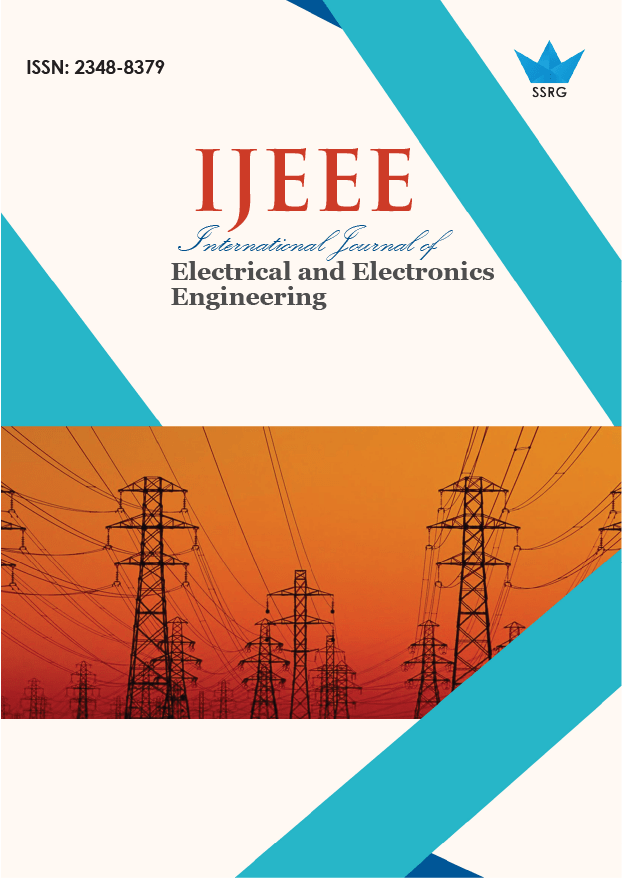Optimal Control Techniques in Applicable Values of Turbine Speed Governor Regulation

| International Journal of Electrical and Electronics Engineering |
| © 2015 by SSRG - IJEEE Journal |
| Volume 2 Issue 8 |
| Year of Publication : 2015 |
| Authors : Youssef A. Mobarak, S. A. Deraz1, M. El-Shahat Dessouki, R. Almazmomi |
How to Cite?
Youssef A. Mobarak, S. A. Deraz1, M. El-Shahat Dessouki, R. Almazmomi, "Optimal Control Techniques in Applicable Values of Turbine Speed Governor Regulation," SSRG International Journal of Electrical and Electronics Engineering, vol. 2, no. 8, pp. 9-20, 2015. Crossref, https://doi.org/10.14445/23488379/IJEEE-V2I8P105
Abstract:
Optimal control is a branch of modern control theory that deals with designing controls for dynamic systems by minimizing a performance index that depends on the system variables. The paper is concerned with power system automatic generation control AGC in dynamic and steady state conditions. A design technique allows all roots of the system characteristic equations to be placed in desired locations, a regulator with constant gain vector K, and the Algebraic Riccati Equation ARE solution. Other approach to the design of optimal controllers by Pole Placement Techniques for feeding back the state variables through a regulator with constant gains. Optimal control deals with designing controls for dynamic systems by minimizing a performance index that depends on the system variables. Application of these optimal controls to power systems control is given through a state space model. The effects of the governor speed regulation on the system stability of a two area systems by Matlab Toolbox.
Keywords:
Speed Governor Regulator, Optimal Control, Automatic Generation Control AGC, Area Control Error ACE, Pole Placement.
References:
[1] M. ldeen, R. Sharma, Robust detection of faults in frequency control loops, IEEE Tran. on Power System, 22(1), Feb. 2007, 413-420.
[2] J. Faiz, G. Shahgholian, M. Arezoomand, Analysis and simulation of the AVR system and parameters variation effects, Proc. POWRENG, Setubal, Portugal, April 2007, 450-453.
[3] P. Aravindan, M.Y. Sanavullah, Fuzzy logic based automatic load frequency control of two area power system with GRC, Inter. Jour. of Comp. Intel. Rese., 5(1), 2009, 37–44.
[4] Y. L. A. Magid, M. M. Dawoud, Genetic algorithms applications in load frequency control, Proc. GALESIA, Dec. 1995, 207-213.
[5] J. L. M. Ramos, A. M. Marcolini, M. T. F. Rivera, "Load and frequency control in compective power systems", Proc. IEEE/MELECON, May 2006, 935-938.
[6] Q. P. Ha, H. Trinh, "A variable structure-based controller with fuzzy tuning for load-frequency control", International J. of Power And Energy Systems, 20(3), 2001, 146-154.
[7] E. Rakhshani, J. Sadeh, Simulation of two-area AGC system in a competitive environment using reduced-order, Proc. 5th International Conference on EEM, Lisboa, May 2008, 1-6.
[8] C. F. Juang, C. F. Lu, Power system load frequency control by evolutionary fuzzy PI controller, Proc. IEEE Int. Conf. Fuzzy system, 2, July 2004, 715-719.
[9] B. Anand, A.E. Jeyakumar, Load frequency control with fuzzy logic controller considering non-linearities and boiler dynamics, ICGSTACSE Jour., 8(3), January 2009, 15-20.
[10] S. A. Taher, R. Hematti, Robust decentralized load frequency control using multi variable QFT method in deregulated power systems, American Journal of Applied Science, 5(7), 2008, 818-828.
[11] D. Rerkpreedapong, A. Feliachi, Decentralized load frequency control for load following services, Power Engineering Socity winter meeting, IEEE, 2, 2002, 1252-1257.
[12] H. Ko, K. Y. Lee, and H. Kim, An intelligent based LQR controller design to power system stabilization, Elect. Power Syst. Res., 71(1), Sep. 2004, 1–9.
[13] A. Zaafouri, et. all., LQG/LTR control of a direct current motor, Proc. IEEE International Conference on Systems, Man and Cybernetics, 5, Oct. 2002.
[14] M. A. Johnson and M. J. Grimble, Recent trends in linear optimal quadratic multivariable control systems design, Proc. Inst. Elect. Eng. Control Theory Appl., 134(1), Jan. 1987, 53– 71.
[15] P. H. Petkov, et.all, Computational methods for linear control systems (Chichester, U.K. Prentice–Hall, 1991).
[16] J. D. Gardiner and A. Laub, “Parallel algorithms for algebraic Riccati equations”, Int. J. Control, 54(6), Dec. 1991, 1317-1333.
[17] W. Pedrycz, Computational Intelligence: An Introduction (New York, Wiley, 2004).
[18] J. V. da Fonseca Neto, An inequalities method for multivariable system’s eigenstructure assignment via genetic multi-objective optimization, Proc. Amer. Control Conf., Denver, CO, 2003, 1476–1481.
[19] J. Wang and G. Wu, A multilayer recurrent neural network for solving continuous-time algebraic Riccati equation, Neural Netw., 11(5), Jul. 1998, 939–950.
[20] B. H. Bakken and O. S. Grande, Automatic generation control in a deregulated power system, IEEE Trans. Power Syst., 13(4), Nov. 1998, 1401–1406.
[21] H. Bevrani, Y. Mitani, K. Tsuji, and H. Bevrani, Bilateral based robust load frequency control, Energy Conversion and Management, 46(7-8), May 2005, 1129–1146.
[22] X. F. Yu and K. Tomsovic, Application of linear matrix inequalities for load frequency control with communication delays, IEEE Trans. Power System, 19(3), Aug. 2004, 1508– 1519.
[23] J. L. Rodriguez-Amenedo, S. Arnalte, and J. C. Burgos, Automatic generation control of a wind farm with variable speed wind turbines, IEEE Trans. Energy Convers., 17(2), 2002, 279–284.
[24] A. Paradkar, A. Davari, A. Feliachi, and T. Biswas, Integration of a fuel cell into the power system using an optimal controller based on disturbance accommodation control theory, J. Power Sources, 128(2), 2004, 218–230.
[25] P. K. Ibrabeem and D. P. Kothari, Recent philosophies of automatic generation control strategies in power systems, IEEE Trans. Power System, 20(1), Feb. 2005, 346–357.
[26] H. Shayeghi, H. A. Shayanfar, and A. Jalili, Load frequency control strategies: A state-of-the-art survey for the researcher, Energy Convers. Manage., 50(2), 2009, 344–353.
[27] A. B. Gamal, M. Z. El-Sadek Y. A. Mubarak, Applicable Values of Turbines Speed Governor Regulation, Proc. 10th MEPCON, Port Said, Egypt, 2005, 39-42.
[28] J. L. M. Ramos, A. M. Marcolini, M. T. F. Rivera, Load and frequency control in compective power systems, Proc. IEEE/MELECON, May 2006, 935-938.

 10.14445/23488379/IJEEE-V2I8P105
10.14445/23488379/IJEEE-V2I8P105